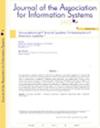分析有助于解决医疗保健环境中的歧义吗?可分析性和差异性的效果对比
IF 5.5
3区 管理学
Q1 COMPUTER SCIENCE, INFORMATION SYSTEMS
引用次数: 0
摘要
组织越来越多地使用数据分析来帮助制定决策并推动积极的结果。但是组织学术警告我们,与分析能力相关的信息处理虽然对减少不确定性有效,但在模棱两可的情况下可能不太有效。当任务不容易分析(任务可分析性)或组织部门高度分化(差异化)时,模糊性很明显。我们假设,当模糊性较高时,由于任务可分析性较低,分析在推动积极结果方面的效果较差。然而,当一个组织更加分化,导致高度模棱两可时,我们预计分析将更有效地推动积极的结果。为了验证这一理论,我们在9年的时间里研究了3000多家医院的临床医疗分析如何影响体验质量(类似于患者满意度)。我们的研究结果表明,平均而言,分析能力确实改善了患者体验质量的结果,这表明分析可以减少不确定性,但我们也发现了模棱两可的调节作用的证据。具体来说,随着任务可分析性的降低(即模糊性的增加),临床医疗保健分析在提高体验质量方面变得不那么有效。然而,当由于差异导致模糊性很高时,临床医疗分析与体验质量之间存在正相关关系,但仅在大型医院中存在。从管理角度来看,本研究对组织中数据分析的边界条件具有启示意义。本文章由计算机程序翻译,如有差异,请以英文原文为准。
Does Analytics Help Resolve Equivocality in the Healthcare Context? Contrasting the Effects of Analyzability and Differentiation
Organizations are increasingly using data analytics to help make decisions and drive positive outcomes. But organizational scholarship has warned us that the sort of information processing associated with analytic capabilities, while effective for uncertainty reduction, may be less effective in equivocal contexts. Equivocality is evident when tasks are not easily analyzable (task analyzability) or when organizational departments are highly differentiated (differentiation). We hypothesize that analytics will be less effective in driving positive outcomes when equivocality is high because of low task analyzability. However, when an organization is more differentiated, resulting in high equivocality, we anticipate that analytics will be more effective in driving positive outcomes. To test this theory, we studied how clinical healthcare analytics influenced experiential quality (akin to patient satisfaction) in over 3,000 hospitals across nine years. Our results show that analytics capabilities, on average, do improve outcomes in terms of patient experiential quality, suggesting that analytics can reduce uncertainty, but we also found evidence for the moderating role of equivocality. Specifically, as task analyzability decreases (i.e., increasing equivocality), clinical healthcare analytics becomes less effective in improving experiential quality. However, when equivocality is high because of differentiation, there is a positive relationship between clinical healthcare analytics and experiential quality but only in larger hospitals. From a managerial perspective, this study has implications for boundary conditions of data analytics in organizations.
求助全文
通过发布文献求助,成功后即可免费获取论文全文。
去求助
来源期刊

Journal of the Association for Information Systems
工程技术-计算机:信息系统
CiteScore
11.20
自引率
5.20%
发文量
33
审稿时长
>12 weeks
期刊介绍:
The Journal of the Association for Information Systems (JAIS), the flagship journal of the Association for Information Systems, publishes the highest quality scholarship in the field of information systems. It is inclusive in topics, level and unit of analysis, theory, method and philosophical and research approach, reflecting all aspects of Information Systems globally. The Journal promotes innovative, interesting and rigorously developed conceptual and empirical contributions and encourages theory based multi- or inter-disciplinary research.
 求助内容:
求助内容: 应助结果提醒方式:
应助结果提醒方式:


